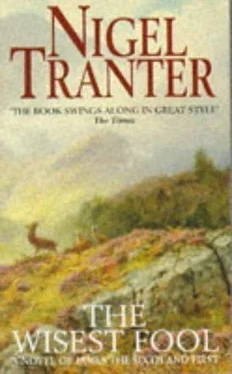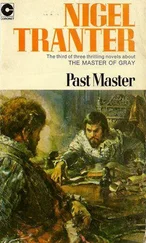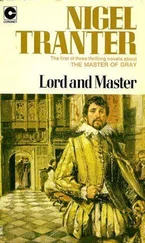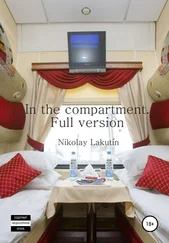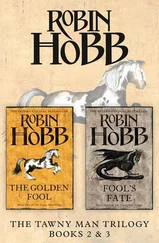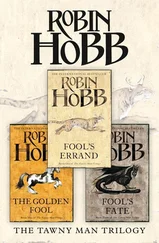Nigel Tranter - The Wisest Fool
Здесь есть возможность читать онлайн «Nigel Tranter - The Wisest Fool» весь текст электронной книги совершенно бесплатно (целиком полную версию без сокращений). В некоторых случаях можно слушать аудио, скачать через торрент в формате fb2 и присутствует краткое содержание. Жанр: Исторические приключения, на английском языке. Описание произведения, (предисловие) а так же отзывы посетителей доступны на портале библиотеки ЛибКат.
- Название:The Wisest Fool
- Автор:
- Жанр:
- Год:неизвестен
- ISBN:нет данных
- Рейтинг книги:4 / 5. Голосов: 1
-
Избранное:Добавить в избранное
- Отзывы:
-
Ваша оценка:
- 80
- 1
- 2
- 3
- 4
- 5
The Wisest Fool: краткое содержание, описание и аннотация
Предлагаем к чтению аннотацию, описание, краткое содержание или предисловие (зависит от того, что написал сам автор книги «The Wisest Fool»). Если вы не нашли необходимую информацию о книге — напишите в комментариях, мы постараемся отыскать её.
The Wisest Fool — читать онлайн бесплатно полную книгу (весь текст) целиком
Ниже представлен текст книги, разбитый по страницам. Система сохранения места последней прочитанной страницы, позволяет с удобством читать онлайн бесплатно книгу «The Wisest Fool», без необходимости каждый раз заново искать на чём Вы остановились. Поставьте закладку, и сможете в любой момент перейти на страницу, на которой закончили чтение.
Интервал:
Закладка:
Heriot informed that the King also seemed to be turning against his Chief Secretary and Lord President There must be something to bring these unlikely forces together, something devious but very potent. It could all be a policy of divide and rule-with three dividers at work. In an academic sense it would be interesting to see which actually did the ruling in the end-although, since one was their sovereign lord, there was no question as to where their duties and hopes should lie.
Alison's opinion of her sovereign lord was not of the highest, and her betrothed found himself, not for the first time, standing up for his peculiar monarch and seeking to explain away some of his manoeuvres for the greater good of his two kingdoms. He was less successful in this than in some of his endeavours with the girl.
She went on to expound upon the King's extraordinary methods and notions of justice, by instancing the case of George Sprott, the late Logan's notary and doer. Balmerino, allegedly on instructions from London, had arrested the Eyemouth lawyer and subjected him to a series of questioning sessions, by torture and otherwise- with the object, it seemed, of proving that Logan Sprott's client and friend, had been one of the main instigators of the notorious Gowrie Conspiracy of eight years before. All the principal actors in that mysterious drama had been extravagantly dealt with, those who supported the King's peculiar story most handsomely rewarded, those on the other side forfeited, slain, executed, even their very names banished. Two figures only, connected therewith by rumour, however persistently, had escaped-Robert Logan of Restalrig and his cousin Patrick, Master of Gray. Poor Sprott was something of a substitute, a scapegoat.
Heriot declared that Logan was a rogue, whether or no he was involved in the Gowrie business. He had long been employed to do the Master of Gray's dirty work-or some of it And his lawyer and close associate was likely to be tarred with the same stick. He would be apt to deserve his uncomfortable questionings.
Perhaps, Alison conceded. But did he deserve hanging? It was surely the first time a lawyer had been hanged for his client's offence!
Brought up short, the man stared at her. She informed him that George Sprott was indeed dead. The Lord Treasurer, the Earl of Dunbar, had gone over the heads of Balmerino, the Chancellor and the Privy Council-therefore, presumably, on the King's direct authority-had taken Sprott out of the Tolbooth, treated him kindly in his own house, ordered a new and gentler questioning by Sir Thomas Hamilton in his own presence-and then, having evidently got what he wanted, set up a swift secret trial and had the lawyer hanged at the Cross the next day. None doubted but so that he could not speak further. The charge was high treason and forgery.
Heriot was not a little shaken. What all this meant he had little idea. But certain implications were clear. Dunbar would never have dared to do it all, over-riding the Chief Secretary, Chancellor and Privy Council, without King James's specific agreement. Therefore it was to the King's advantage that Sprott should be silenced for good. But Balmerino had questioned him at length, earher-so Balmerino probably now had the same information. It would be a rash man, in the circumstances, who gave the Chief Secretary a long life and fortune.
One phrase worked in Heriot's mind-high treason and forgery. Treason was the obvious blanket-charge, to cover practically all activities of which the Crown did not approve. But forgery was different, on another level altogether. In this context, what did it mean? To use the word in the same breath as high treason? What forgery could be important enough for that-and linked presumably with Logan of Restalrig, the only point at which poor Sprott impinged on national affairs? It was Logan's papers which had revealed the whereabouts of the Casket Letters-at least to all but the King, Queen and Orkney. Logan's papers would have been in the care of his notary. Forgery, then-it could be that! The Casket Letters, the most damning and dangerous papers in all Scotland's story, which had already brought a queen to the block? Was this the answer to the riddle-a copy of the Letters, or some of them? It could explain much-including why the Master of Gray was apparently presently supporting Dunbar against Balmerino. If he held the originals, he would be much concerned about copies, extracts or forgeries. Was this, in fact, what the Gowrie Conspiracy had been about? The Gowrie family had also, at one time, held these fateful Letters-and had paid the penalty. Had George Sprott been just too clever a lawyer and kept a copy?
Alison had more than that to tell. The rumour in Edinburgh was that the Earl of Dunfermline was as likely to fall as was Balmerino. He was, strangely enough, Provost of the city as well as Chancellor-multiplicity of offices being a feature of the regime -and it was being whispered in the wynds and closes that Dunbar's spies were watching the Earl's every move, bailies being secretly questioned and threatened, and so on. The girl said that her father did not give the Chancellor six months. Small wonder if he, and all the Council of which Dunfermline was chairman, were worried men. A kind of quiet terror was beginning to reign in high places in Scotland.
When, after a few days, George Heriot took reluctant farewell of his bride-to-be, promising that, though the heavens should fall, he would be up to marry her next summer-having now actually got the marriage-contract signed by her father-he too was a worried man. Clearly crisis point was rapidly being reached in the affairs of his native land, and he did not at all like the way that crisis appeared to be shaping. Everything pointed to the most intricate, unscrupulous, not to say Machiavellian plotting, and all emanating from the ultimate source of power, the King himself. Admittedly the Master of Gray was undoubtedly engaged in equally elaborate and dangerous plotting; in fact the whole Scottish situation was almost certainly a personal duel between these two so different but equally subtle and devious protagonists, a long-drawn-out chess game, with ministers of state as well as lesser men, governments, parliaments, even religions, as mere pawns to be moved and manipulated and sacrificed at will. Clearly the game was reaching a decisive stage-and Heriot misliked being one of the pawns, misliked being connected in any way with the entire ominous and alarming affair. Especially just when the greatest personal happiness of his life was imminent-and might conceivably be put in jeopardy.
As he rode southwards, in uneasy frame of mind, he asked himself-as so often before-what it was the King wanted from him in these errands and commissions? When there were obviously so many other spies, agents and informers in action already. James did not need him, his goldsmith and banker, for underground probings when he had Dunbar and all his minions, besides God alone knew what other secret informants. Yet there must be a reason. Could it be that James trusted him, where he did not fully trust Dunbar or any of the others? Knew him to have no ambition, as regards power, position or more wealth than he had already? If friendship was the word, they had been friends for a long time, near twenty years now-and by the very nature of things, James could have few friends. Indeed, apart from Ludovick Stewart, he could think of none-since favourites and courtiers could never be classed as friends. A reigning monarch's position was the acme of loneliness-and perhaps James Stewart needed friends? However little these might affect his behaviour and policies. That might be the answer. The thought did not make the man any more joyful.
21
BACK IN LONDON, no atmosphere of crisis, or indeed of urgency, was detectable. James appeared to be wholly engrossed in young Carr, and each day hinged on the Latin lesson-with the King now said actually to be using a rod to chastise his pupil, when necessary, with kisses to counter any ill effects. Not that this was allowed to interfere too greatly with James's other activities, the Court spending most of its time in Hertfordshire, either at Royston or at Salisbury's house of Theobalds, hunting, feasting, gambling, debating philosophy and theology, or just drinking.
Читать дальшеИнтервал:
Закладка:
Похожие книги на «The Wisest Fool»
Представляем Вашему вниманию похожие книги на «The Wisest Fool» списком для выбора. Мы отобрали схожую по названию и смыслу литературу в надежде предоставить читателям больше вариантов отыскать новые, интересные, ещё непрочитанные произведения.
Обсуждение, отзывы о книге «The Wisest Fool» и просто собственные мнения читателей. Оставьте ваши комментарии, напишите, что Вы думаете о произведении, его смысле или главных героях. Укажите что конкретно понравилось, а что нет, и почему Вы так считаете.
